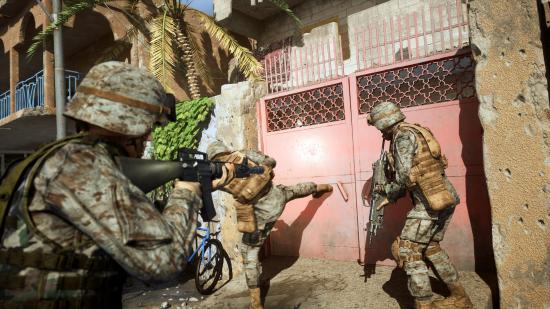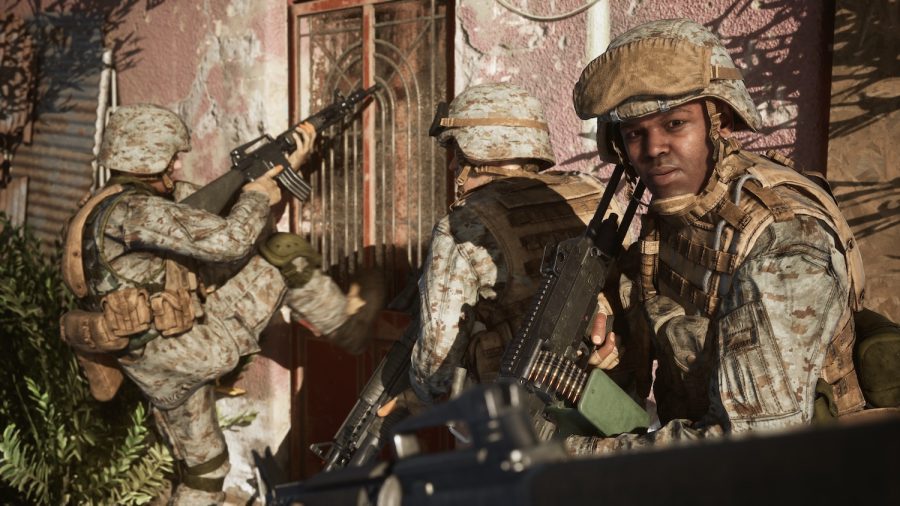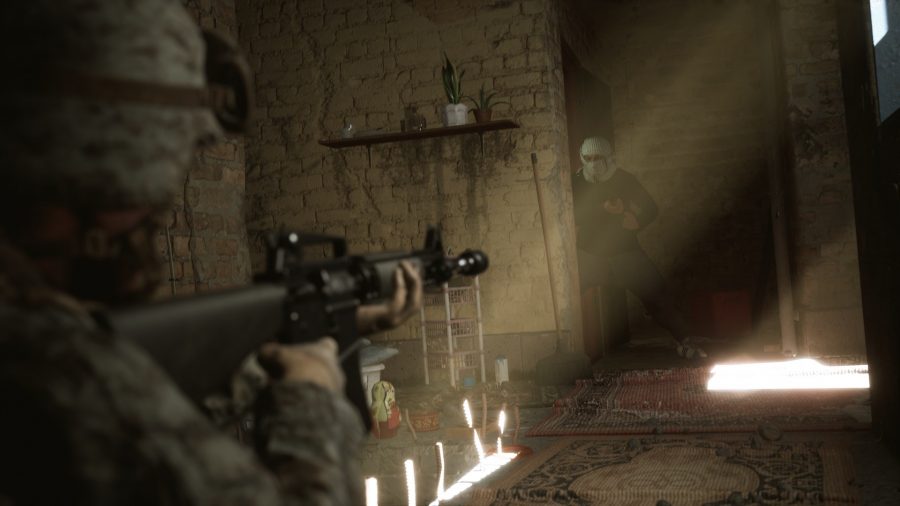Earlier this week, the developer of the controversial FPS game Six Days in Fallujah said it understands that the events it’s setting out to depict “are inseparable from politics”, and that its goal is to tell the story of the second battle of Fallujah from a variety of perspectives. This followed intense online criticism after the announcement in February that it had resumed development more than ten years after its original publisher, Konami, backed out of the project.
“The stories in Six Days in Fallujah are told through gameplay and documentary footage featuring service members and civilians with diverse experiences and opinions about the Iraq War”, Victura said in its statement, posted to Twitter. “So far, 26 Iraqi civilians and dozens of service members have shared the most difficult moments of their lives with us, so we can share them with you, in their words.”
Some of the criticism levelled against Victura following the announcement of Six Days in Fallujah’s revival had to do with concerns that the game would be told from a perspective that minimises or flat-out erases atrocities committed by US forces against Fallujah’s citizens, such as the documented use of white phosphorus against enemy combatants – a practice banned under the Geneva convention and by British law.
We spoke with Victura CEO Peter Tamte shortly after that reveal in February. He says that Six Days in Fallujah is presented in a documentary style, intercutting gameplay sequences with interview footage of US troops and Iraqi civilians who were present during the battle. Victura says that while players will not be able to use white phosphorus in Six Days in Fallujah, its use in the battle is described “during the documentary segments.”
We understand the events recreated in Six Days in Fallujah are inseparable from politics. pic.twitter.com/N7nkPilp1Q
— Victura (@VicturaGG) March 8, 2021
In February, Tamte explained to us that his reluctance to stake out a personal political point of view on the Iraq war, or the events leading up to and during the second battle of Fallujah, stemmed from his belief that his own view of the war is unimportant compared to that of the people who experienced it first hand. He never said the game he is making is ‘not political.’
“The truth is that the marines and soldiers themselves are not unified in their opinions about the Iraq war,” he told us. “In fact, many of them very vocally opposed the war at the same time that they were being asked to risk their life for it. So when people over the years have asked me, what do you think about the Iraq war, my answer is, I don’t think people care what I think – I think they care a whole lot about what these service members thought and what these Iraqi civilians thought. And our job is to try to be a conduit for their voice, and not have my voice come through.”
Tamte also gave us additional details about the Iraqi civilians his team has worked with in compiling the stories that will form the narrative basis of Six Days in Fallujah. Prior to the project’s first cancellation, the developers worked with a journalist who interviewed approximately 15 Iraqi citizens, a group that Tamte says included teachers, journalists, political leaders, and a sheikh. Victura’s staff journalist then travelled to Fallujah “about a year ago” to collect more accounts and to visit some of the locations depicted in the game. A third group of Iraqis consisted of recent immigrants to the US.
“We have remarkable stories,” Tamte told us. “Honestly, the frustration for me is that I don’t know how to tell all these stories, because each one is compelling in its own way.”
Based on our conversation with Tamte, it’s clear that he thinks of Six Days in Fallujah as a documentary or journalistic enterprise. He went so far as to say games have a moral obligation to deal with difficult historic subject matter.
“It bothered me profoundly that we as a medium are not allowed to tell stories that other media can,” he told us. “I think that not only should we, but we have a responsibility to tell these stories.”
Before Six Days in Fallujah’s first cancellation, Tamte said Konami ran market research and found that only about half of young people were familiar with the battle of Fallujah, even in 2009. He said that figure is almost certainly even lower today, almost 12 years later.
“That’s concerning, right? Because as time goes by, as we distance ourselves from these battles. It’s not just that we forget the sacrifice of the individuals who are in that battle, we also forget the human cost of that battle,” he said.
Tamte pointed to the ‘talkies’ that brought World War II back to the homefront and the television broadcasts from Saigon and the Ia Drang Valley during the Vietnam war. “This is our form of media, and we need to be using what is unique about this medium to help people understand events that are shaping our world. It’s not just ‘can we do this?’ We must do this.”
Reasonable concerns about Six Days in Fallujah’s approach to this endeavour persist, however. Developer Rami Ismail posted a lengthy Twitter thread explaining his reluctance to trust Victura’s intentions with the project when it was announced, and following the company’s latest statement this week he reposted the thread, saying that the majority of those issues remain unaddressed.
Asked about Tamte’s account of what he’s trying to achieve, Ismail tells us he isn’t opposed conceptually to Six Days in Fallujah. “I 100% agree with the premise of the game, right?” he says. “The idea of a documentary game about what happened in Fallujah is risky, and the idea of it is brave and daring, and something I would applaud in our industry. The idea of covering something that difficult and complex in a way that is genuine and sincere, I would 100% back that. Being able to play that sounds terrifying, and uncomfortable, and not fun – it feels like something you would not want to play unless you really wanted to be curious about what this [event] was like.”
Tamte says games “should be the greatest empathy machines humanity has ever created” by allowing players to literally walk in another person’s shoes, but Ismail says he’s concerned over who that empathy is being generated for: is it the Iraqi civilians living in terror during the siege of Fallujah, or is it for the heavily armed soldiers moving through neighborhoods while looking for possible insurgents, going from house to house and kicking down the doors?
“I can’t look at that game and take it as sincerely if I only see one side of that door,” Ismail explains. “That door becomes the hinge on which everything hangs… how are you telling the story of Fallujah without the other side of the door?”

Setting Tamte’s explanations aside momentarily, it’s understandable that anyone might look at the marketing materials for Six Days in Fallujah and draw the conclusion that the game has a US-centric point of view. The official trailer that Victura released in February shows gameplay footage of marine fireteams moving through urban alleyways and clearing homes. The interview footage that’s shown is of former US servicemembers and analysts, and the voiceover emphasizes the importance – and the supposed justice – of the assault on Fallujah. When a title card says the stories are “recreated by those who were there,” the next shot is of a marine, armed with an M-16, running down a street strewn with rubble. There’s very little imagery in the trailer that indicates that Six Days in Fallujah intends to show both sides of the door.
“We could have done a better job there,” Tamte admits. “The first three voices in our announcement trailer are all Iraqi. And, importantly, they describe how decisions by US policy makers to disband the Iraqi army created the conditions that led to the growth of Al Qaeda in Iraq. And, this is a perspective many Iraqis shared with us.”
In the preface to his book The Fighters, New York Times war correspondent and former Marine Corps officer CJ Chivers writes that “the people who lived where Americans fought and patrolled, and whose protection was presented in official statements as one of the wars’ organising ideas, often were regarded by those on duty in the provinces as scenery, puzzles, problems, or worse… The result was that during action, and after, American combatants had little means to gain insight into the views or experiences of Afghan and Iraqi civilians, as is often evident in veterans’ memories and accounts of their tours.”
“The thing that they promise they’re making – the truth of this awful siege – would be a fascinating game,” says Ismail. “But seeing a war from an American perspective, to feel empathy with US soldiers and the difficulties that they faced, using the Iraqi civilians as props to tell a story of the heroism of the US military? No, I’ve seen that before.”
Tamte tells us that the majority of Six Days in Fallujah is about the experiences of soldiers and marines, but that Iraqis’ stories are both integrated into those stories and in some cases are presented on their own, separate from the concerns of US forces. “The Iraqis we’ve spoken with for the game are gracious, warm people whose lives have been turned upside down by two decades of war,” Tamte says. “I hope players will see our willingness to tackle tough topics and present Iraqi perspectives within the game as well.”
Read more: The biggest upcoming PC games of 2021
The second battle of Fallujah lasted from November 7 to December 23, 2004. In just nine of the city’s 27 neighborhoods, 700 civilian bodies were recovered from the rubble of homes and stores, according to UN estimates. Some 550 of these were women and children. Even today, residents of Fallujah continue to experience elevated rates of cancer, miscarriage, and radiation poisoning linked to munitions used there by coalition forces in 2003.
Six Days in Fallujah is scheduled for release sometime this year.


